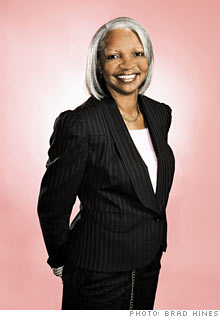Finding my inner CFO
Once I learned to delegate, my business grew and became profitable.

CARSON, CALIF. (Fortune Small Business) -- My husband raised the alarm in early 2006. After nine years my job-training and placement business had stalled. Human Potential Consultants was still in startup mode, bringing in less than $400,000 in annual revenue. I was drawing no salary, and we struggled to meet payroll each month.
Eric, who had supported me and the company by writing checks when business bills came due before my clients paid, finally issued an ultimatum.
"This is the last $43,000 that I'm loaning you," he said. "You just have to get your business in order."
My sister, Joyce Keener, and I started the firm in 1997. She works in Detroit as executive director, and I'm the California-based CEO. We partner with government agencies to help needy folks get back to work. We cater to parolees, military veterans, the disabled, and, in particular, displaced older workers. Our first big contract came from the city of Compton in Los Angeles County. I'm very proud of our record in matching worthy job seekers with positions.
In our first five years, we had only four employees, counting my sister and me. I would start working from home at 3 A.M., get to the office by eight, and head off at five to teach a sociology class at a local college. And I worked weekends too.
None of us had defined job roles. I would run workshops and write handouts while networking, dealing with the finances, and trying to find new business. I knew we would make more money if I hired some help, but I took it all on because I felt no one else could do the job as well as I did. Plus, I was passionate about the company's mission - helping those who had fallen through the cracks. I ran the firm with my heart and didn't worry about the money.
Looking back, I can see that my I'll-do-it-myself attitude seriously hampered our growth. For example, I began the process of applying for all kinds of certifications, such as 8(a) - which helps minority- and woman-owned businesses bid for federal contracts - but I never completed the paperwork.
Soon after my husband had cut me off, I won a contest for women entrepreneurs. My prize included financial counseling as well as the services of a career coach. Everything started to change at that point.
My coach forced me to focus on getting systems in place and not just reacting to the latest crisis. Now I set aside Fridays to review my finances and plan ahead.
She asked me to consider where I wanted to be in five years (retired), what we as a company did well, and how we might grow the business. She taught me how to sell my firm to banks in order to get a line of credit. I learned how to tailor bids to each customer to increase the chances of success. In the past, I used to bid like a cook testing whether the spaghetti was done: I'd throw it against the wall and hope it stuck. I now have the confidence to go after bigger contracts, because I know how to win them.
The counselor got me out of the office to network and pitch new business, which forced me to hand over day-to-day tasks to my employees. Six months later I landed an $800,000 contract with the Department of Corrections - my largest job at the time.
All these changes have renewed the company. At the beginning of 2008, I hired a chief operating officer and a human-resources manager. We even have an employee manual with full job descriptions, a must because we are up to 90 workers from just ten in 2005.
I'm now free to focus on the company's long-term goals. I attend conferences and go out to meet with customers and other business owners. And I have a radically different way of looking at what I do. Before, I thought my clients were the job seekers who attend our workshops. But now I recognize that I serve the government organizations that have contracted for my company's services.
I've just won a $2.8 million contract with the Twentynine Palms Marine Corps Base in California, thanks to my 8(a) certification. My revenue has taken off, from $400,000 in 2006 to $5.8 million in 2007. About 300 job seekers walk through our doors each month, double the number we saw in 2005. We have been profitable since 2006, and I even take a salary.
Best of all, I'll pay off my debt to my husband this month.
Owner's Manual is written by entrepreneurs about lessons they have learned. To give feedback or column ideas, write to us at fsb_mail@timeinc.com. ![]()
After the Wal-Mart deal: An entrepreneur lands distribution with Wal-Mart - then learns that breaking into big retail is just the start of her sales work.
How to grow fast in down times
From Iraq to B-school: Retraining disabled vets
Starting a business from behind bars
-
The Cheesecake Factory created smaller portions to survive the downturn. Play
-
A breeder of award-winning marijuana seeds is following the money and heading to the U.S. More
-
Most small businesses die within five years, but Amish businesses have a survival rate north of 90%. More
-
The 10 most popular franchise brands over the past decade -- and their failure rates. More
-
These firms are the last left in America making iconic products now in their twilight. More












